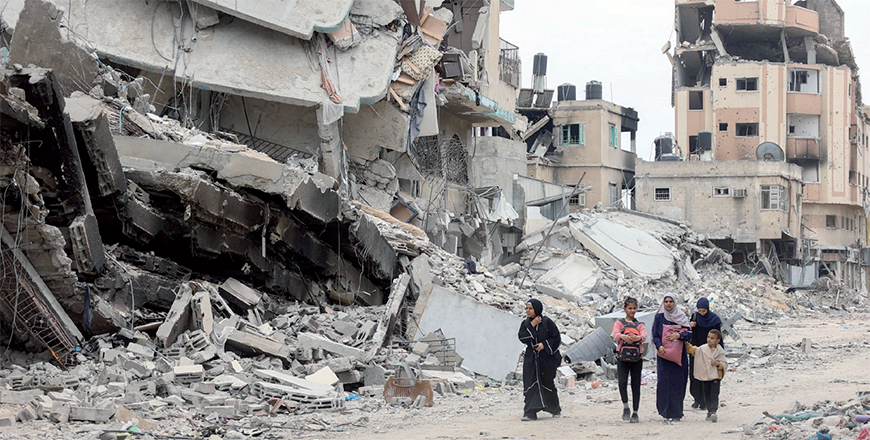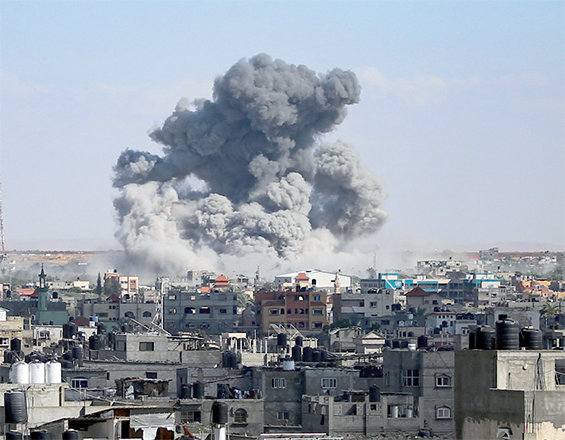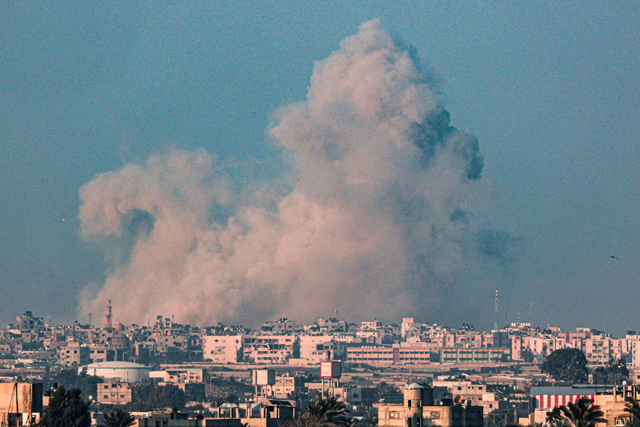You are here
Hamas, Israel dampen hopes for speedy Gaza truce deal
By AFP - Apr 09,2024 - Last updated at Apr 09,2024

Palestinian women and children walk past the ruins of buildings destroyed by earlier Israeli bombardment in Gaza City on Monday (AFP photo)
GAZA STRIP, Palestinian Territories — Hams and Israel both dampened hopes on Monday of a speedy breakthrough in Cairo talks towards a Gaza truce and hostage release deal after Egyptian state-linked media had reported "significant progress".
As the Gaza war raged on into a seventh month, Israel is under growing international pressure to agree to a ceasefire, including from its top ally and arms supplier the United States.
Prime minister Benjamin Netanyahu insisted on Sunday — half a year after the October 7 sudden attack — that Israel is "one step away from victory" and has vowed to defeat remaining Hamas fighters in Gaza's far-southern Rafah city.
On the same day however, the army also announced it had pulled its forces out of southern Gaza, although military commanders stressed the withdrawal was tactical and did not signal an end to the war.
Defence minister Yoav Gallant said the troops would “prepare for future missions, including ... in Rafah” on the Egyptian border where almost 1.5 million Gazans live in crowded shelters and tents.
Amid the threats and ongoing fighting, Netanyahu has sent negotiators to fresh truce talks that started in Cairo on Sunday, joined by US, Qatari and Egyptian mediators.
US President Joe Biden sent CIA chief Bill Burns to the talks, three days after a terse phone call with Netanyahu in which Biden demanded a halt to the fighting and greater steps to help and protect Gaza civilians.
Egypt’s state-linked news outlet Al Qahera reported “significant progress being made on several contentious points of agreement”, citing an unnamed high-ranking Egyptian source.
The Qatari and Hamas delegations had left Cairo and were expected to return “within two days to finalise the terms of the agreement”, it said, while the US and Israeli teams were also planning 48 hours of consultations.
However, Israel’s Ynet news outlet cited an unidentified Israeli official as tempering the upbeat Egyptian report and stressing that “we still don’t see a deal on the horizon”.
“The distance is still great and there has been nothing dramatic in the meantime,” the Israeli official was quoted as saying by the Hebrew-language website.
A separate senior Israeli official was quoted by Ynet as saying that “patience is needed. There is potential, but we are not there yet”.
A senior Hamas official meanwhile told AFP that “we cannot speak of concrete progress so far”, with disagreement centred on the pace of displaced Palestinians returning to Gaza City in the north.
Smell of death
Netanyahu also faced pushback from one of the far-right allies he needs to maintain a parliamentary majority and stay in power, national security minister Itamar Ben Gvir.
Ben Gvir warned on X, formerly Twitter, that “if the prime minister decides to end the war without an extensive attack on Rafah in order to defeat Hamas, he will not have a mandate to continue serving as prime minister”.
Thousands of protesters gathered on Sunday in front of Israel’s parliament to demand the return of the captives.
“Stay strong, you who are still there,” cried 17-year-old former hostage Agam Goldstein with tears in her eyes.
Israel’s retaliatory offensive has killed at least 33,207 people in Gaza, mostly women and children, according to the health ministry in the Hamas-run territory.
A siege has deprived Gazans of most water, food and other basic supplies — the dire shortages only eased by aid trucks and, in recent weeks, airdropped relief supplies.
Vast areas of Gaza have been turned into a rubble-strewn wasteland, with damage to infrastructure, mostly housing, estimated at $18.5 billion, a World Bank report said.
On Sunday, after Israeli forces left Khan Yunis, displaced Palestinians streamed back there, stunned by the level of destruction.
“We don’t have a city anymore — only rubble,” said Maha Thaer, a mother of four, as she walked among the charred ruins.
“There is absolutely nothing left. I could not stop myself crying as I walked through the streets,” said the 38-year-old, whose home was partially destroyed.
“All the streets have been bulldozed. And the smell... I watched people digging and bringing out the bodies.”
Thaer said she would nonetheless move back into her badly damaged apartment because although “it is not suitable for living... it is better than a tent”.
‘Any scenario’
As the war in Gaza has raged on, the wider Middle East has seen a surge of violence involving Iran-backed militant groups in Lebanon, Syria, Iraq and Yemen.
Israel was widely blamed for a strike early last week on the consulate building in Syria of its arch foe Iran, sparking threats or retaliation from Tehran.
An adviser to Iran’s supreme leader Ali Khamenei warned Sunday that Israeli embassies were “no longer safe” after the strike in Syria that killed seven Revolutionary Guards members.
Gallant said Israel was ready after the army had “finished all its preparations to react to any scenario that could arise regarding Iran”.
The Israeli forces also said it had reached “another phase” of preparation on its northern border with Lebanon, where it has traded fire with Iran-backed Hizbollah for months.
The Israeli military said Monday it had killed a Hizbollah commander, Ali Ahmed Hussein of the elite Radwan Forces, in an overnight air strike in the area of Sultaniyeh in southern Lebanon.
United Nations officials said that six months of violence on the Israel-Lebanon border “must stop”, urging de-escalation “while there is still space for diplomacy”.
Related Articles
RAFAH, Palestinian Territories — Israel's military on Monday called for the evacuation of Palestinians from eastern Rafah ahead of a ground
GAZA STRIP, Palestinian Territories — Israel's prime minister said on Sunday a potential ceasefire in its war against Hamas fighters would o
OCCUPIED JERUSALEM — A ceasefire in the Gaza war will begin Sunday morning at 0630 GMT, mediator Qatar said on Saturday after Israel's cabin















